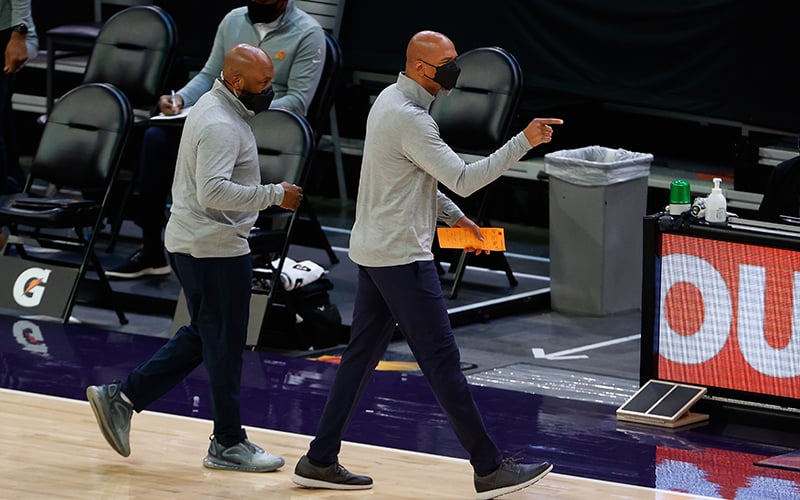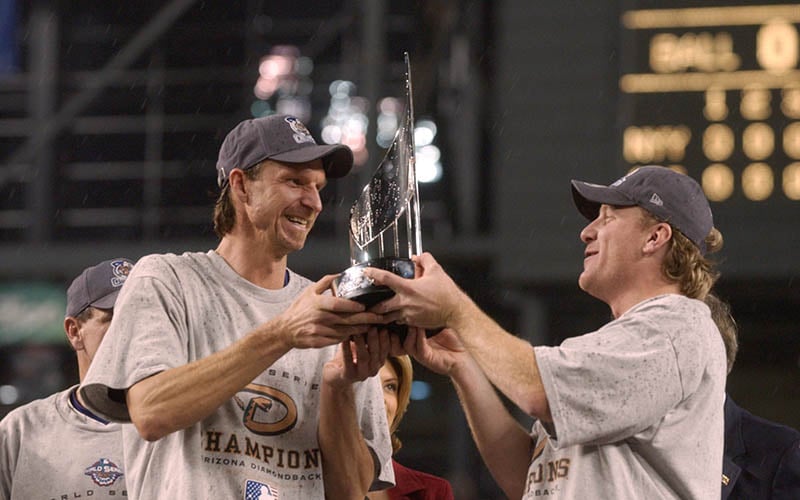
Phoenix Suns coach Monty Williams (right) reacts after being ejected for arguing a technical foul against Minnesota Friday. Afterward, Williams complimented his replacement, assistant coach Willie Green. (Photo by Christian Petersen/Getty Images)
PHOENIX — After looking over the details of his team’s 123-119 loss to the Minnesota Timberwolves, Phoenix Suns coach Monty Williams raised his voice like an editor in a newsroom, saying the following should be printed as a headline for their defeat to the NBA’s worst team.
“They kicked our butt tonight,” Williams said after Thursday’s game. “We could sit here and talk about what we didn’t do and turning the ball over. It didn’t go away.”
Despite holding a 15-point third-quarter lead, the Suns could not hold on for a win, an existing theme in a season that has been otherwise promising with a 27-13 record, third-place standing in the Western Conference and overwhelming optimism toward their first playoff berth since 2009-10.
Phoenix has held a double-digit lead in six of its 13 losses this year, including three in which it led by 10 or more after halftime. Perhaps most troubling is three of its defeats in which it had a double-digit edge, and eight of its losses overall have come against opponents with a record below .500.
It is a pattern Williams and his players took accountability for after their loss to the Timberwolves, who entered Thursday’s contest with a 9-31 record, and later corrected in their 113-101 win over Minnesota in the second game of a back-to-back set on Friday.
“I did not have our guys ready to play tonight, mentally, schematically, in every area,” Williams said on Thursday. “I did not have us ready to play. That’s squarely on me.”
Added starting forward Mikal Bridges, “Didn’t come out the way we should have. We played down to our opponent. We were just looking at our record. We didn’t bring it the whole 48 (minutes) and they played harder than us.”
Despite ranking seventh in offensive efficiency, the Suns have at times been troubled by their own mistakes on that end. They had 10 first-quarter turnovers and 22 total against the Timberwolves on Thursday, far above their sixth-ranked average of 13.4 per game, and 18 on Friday despite their double-digit win.
Of late, the issues haven’t been an outlier either. Phoenix has exceeded 13 turnovers in four of its five games since the All-Star Break and six of its last eight contests overall, resulting in two losses in its last four games after it won eight of its previous nine.
Several of the Suns’ errors have come in live-ball scenarios, often creating transition opportunities for their opponents. Playing in an offensive system in which they look to shoot, dribble or pass within half a second, the Suns have instead been outshot in five of their last eight games after taking more attempts than their opponents in eight of their previous 12 contests.
“Turnovers should never be accepted,” Williams said Thursday. “It was careless passes, a lack of setting up. So all the things that we should be focused on in practice just didn’t do it at a high level tonight. And again, that’s me.”
Those errors have hurt Phoenix defensively, as it has given up more than 120 points in three of its five games since the All-Star break. Its 40 combined turnovers led to 44 points for Minnesota on Thursday and Friday, limiting it from making adjustments when it has needed to.
Timberwolves rookie guard Anthony Edwards became the third-youngest player in NBA history to record a 40-point game against the Suns on Thursday, totaling 42 on 15-of-31 shooting. Like previous contests, Phoenix struggled to make adjustments to stop him, as Minnesota took advantage of the Suns’ drop pick-and-roll coverage intended to force Edwards to shoot from the perimeter or attack the basket, as he is shooting just 49.4 percent this season from shots within 10 feet.
The Timberwolves responded by implementing a two-man game with Edwards and center Karl-Anthony Towns, who had 41 points on 15-of-24 shooting, and created opportunities in which Towns popped to the perimeter for 3-pointers — which the Suns’ bigs struggled to recognize — or Edwards was fouled going downhill at the rim. Suns center Deandre Ayton struggled to guard the action in particular, fouling out in just 26 minutes played.
First time I've been able to watch Anthony Edwards extensively in the NBA, and he's been very impressive.
18 first-half points and he's shown it all, creating off the bounce, catch-and-shoot and this athletic finish.
Definitely showing why he was the No. 1 pick. pic.twitter.com/SLzvNM6P23
— Trevor Booth (@TrevorMBooth) March 19, 2021
Afterward, Williams took blame for not making proper defensive adjustments.
“I did not have us ready to play, that’s squarely on me,” Williams said. “When two guys can go for 83 points, I did not make the adjustments against those guys to give us a chance to be our best, but it boils down to not having our team ready to play. That’s squarely on me.”
The Suns did a better job against the Timberwolves’ top players on Friday, limiting Edwards to just 11 points on 4-of-18 shooting. Towns had 24 points and nine rebounds on 9-of-12 from the field, though he also had five turnovers.
After Williams was ejected from the game in the second quarter, Suns assistant coach Willie Green stepped in and had a “great presence,” according to Williams, to lead Phoenix to a victory.
“The guys respect him and when he came in the back at halftime, he ran the whole show,” Williams said. “At the end, he brought the team in and shared some thoughts. We know Willie Green is a guy that can be a head coach for a team, and we’re glad to have him be a part of our program.”
Following Friday’s win, the Suns remain just ½ a game back of the Los Angeles Lakers, who they play at home on Sunday, for second place in the Western Conference and 2 ½ games back of the first-place Utah Jazz. After facing the Lakers, Phoenix will have six of its next eight contests against teams currently below .500, an opportunity to move up the standings if they can take advantage of it.
To do so, the Suns will need to be clicking constantly on all cylinders. They still rank fifth in defensive efficiency but also rank 13th in opponent points allowed per 100 possessions (111.4) since the All-Star break according to Cleaning The Glass. Tied for the third-slowest pace in the NBA, the Suns rely on their defensive energy to generate their offensive output, something they will have to maximize in the coming weeks.
Friday’s victory was a sign of Phoenix’s ability to adjust, but it will have to do so more often and consistently as it gets closer to the postseason.
“We always say we don’t want to win two games in a row, but that’s also not a good thing if you always got to say, ‘Don’t lose two games in a row,’ because that means you lost,” said Suns guard Chris Paul on Friday. “So I think this team, we understand what we have to do and we’re going to keep building.”

